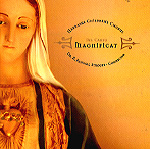If you’ve heard this choir before (check Search Reviews for discussions of earlier releases) you know what to expect here: lustrous ensemble sound, crisp, clear, clean articulation, irresistible rhythmic energy, keen intonation, and impressive command of some very challenging music. In this two-disc program (35 works) we’re treated to five Magnificats, all different in style–from chant and early-20th-century settings to more “modern” versions by Herbert Sumsion, Swedish composer Agneta Sköld, and conductor Z. Randall Stroope–as well as a widely varied array of original and arranged works for treble voices.
The choir’s technical prowess is most notably displayed in works such as József Karai’s four-part Hodie Christus natus est, a fast-paced series of overlapping, cascading lines that excitedly proclaims the birth of Christ; precise articulation describes the choir’s delivery in David Willcocks’ lively setting of Under the Greenwood Tree; and the pure joy of choral singing is evident everywhere in the several Stroope pieces, especially There is no rose, whose unusual, unforgettable melody (those wonderful major-sevenths!), scintillating harmonies, oboe/piano scoring, and various other expressive devices perfectly capture the timeless text.
Strangest of all has to be Finnish composer Pekka Kostiainen’s Jaakobin Pojat, a five-part work whose text consists of the names of the 12 sons of Jacob. The singers are asked to use their voices in all sorts of “non-conventional” ways, from long slides and percussive shouts to clustered tones and other unpitched, improvisational-sounding effects that occasionally are combined with more traditional if mostly dissonant harmony. Several selections from opera are included, namely a perfectly icky coven of witches in the “Witches Chorus” from Verdi’s Macbeth, a sweetly rendered “Ombra mai fu” from Handel’s Serse, and a suitably lilting “Dôme épais” from Delibes’ Lakmé.
A chamber orchestra and various other instruments (harp, organ, saxophone) accompany the choir for some selections, and an adult ensemble joins Bel Canto for what may be the best-on-disc rendition of the oft-performed Ave Maria by Franz Biebl. Of course, intonation isn’t always perfect–sopranos have their under-pitch moments on a few pieces–and the recording doesn’t capture the natural brilliance of the piano’s upper registers. But these are very minor concerns. Just listen to these young virtuosos nail every note and rhythm of Holst’s furious little gem God of Fire. A must for choral fans! [9/29/2003]
































